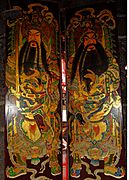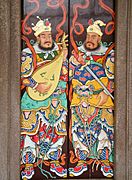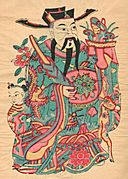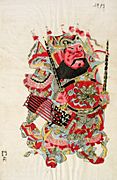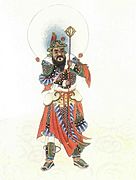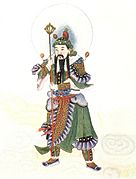Menshen facts for kids
Quick facts for kids Menshen |
|||||||||||||||
|---|---|---|---|---|---|---|---|---|---|---|---|---|---|---|---|
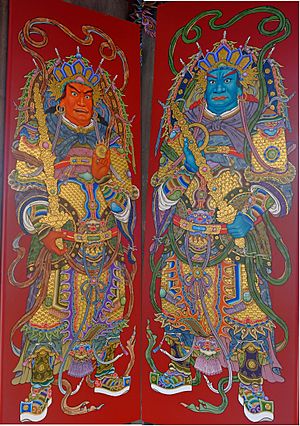
Menshen in Taiwan
|
|||||||||||||||
| Traditional Chinese | 門神 | ||||||||||||||
| Simplified Chinese | 门神 | ||||||||||||||
| Literal meaning | gate god(s) | ||||||||||||||
|
|||||||||||||||
| Martial Door Gods | |||||||||||||||
|---|---|---|---|---|---|---|---|---|---|---|---|---|---|---|---|
| Traditional Chinese | 武門神 | ||||||||||||||
| Simplified Chinese | 武门神 | ||||||||||||||
| Literal meaning | military gate god(s) | ||||||||||||||
|
|||||||||||||||
| Civil Door Gods | |||||||||||||||
|---|---|---|---|---|---|---|---|---|---|---|---|---|---|---|---|
| Traditional Chinese | 文門神 | ||||||||||||||
| Simplified Chinese | 文门神 | ||||||||||||||
| Literal meaning | literary gate god(s) | ||||||||||||||
|
|||||||||||||||
Menshen, also known as door gods, are special guardians found on doors and gates in Chinese folk religion. People believe these divine figures protect homes and temples from bad influences. They also help bring in good luck and positive energy.
Long ago, during the Han dynasty, the first door gods were two deities named Shenshu and Yulü. Later, during the Tang dynasty, two brave generals, Qin Shubao and Yuchi Gong, became much more popular door gods.
Contents
History of Door Gods
The doors and gates of Chinese homes have always been important. People have offered special prayers to door spirits for a very long time. Records from an ancient book called the Book of Rites show that these rituals happened early on.
By the Han dynasty, the door spirit had become two gods: Shenshu and Yulü. People would paint their names or pictures on peachwood and attach them to doors. This was thought to keep evil away.
Later, during the Tang dynasty, the emperor, known as the Great Ancestor, was having terrible nightmares. To help him, he ordered pictures of his trusted generals, Qin Shubao and Yuchi Gong, to be put on his palace gates. Over time, these generals became seen as divine protectors. They eventually replaced Shenshu and Yulü as the most common door gods, a tradition that continues today.
There are two main types of door gods:
- Martial door gods are like soldiers. They are often brave military leaders who protect against evil spirits and bad influences. Qin and Yuchi are examples of these.
- Civil door gods are like scholars or wise officials. They are meant to attract good fortune and blessings.
Some gods also have their own guardians at their temples, similar to door gods. For example, Mazu, a sea goddess, has companions named Qianliyan and Shunfeng'er who serve this role.
The Legend of the Door Gods
A famous Chinese story from the novel Journey to the West tells us how door gods came to be.
In this tale, the Dragon King of the Jing River disguised himself as a human. He wanted to trick a fortune teller named Yuan Shoucheng. The Dragon King could control the weather, so he made a bet with Yuan about the next day's weather in the city of Chang'an.
To his surprise, the Dragon King then received an order from the Jade Emperor, the ruler of Heaven. The order told him to make the weather exactly as Yuan had predicted! The Dragon King decided to ignore this heavenly order. He wanted to win his bet with Yuan.
The next day, the Dragon King went to Yuan to brag about winning. But Yuan remained calm. He revealed that he had known the Dragon King's true identity all along. Yuan also told the Dragon King that because he had disobeyed the Jade Emperor, he would soon be punished.
The Dragon King was terrified and begged Yuan to save him. Yuan took pity on him and said that the Jade Emperor would send Wei Zheng, a senior minister from the Tang emperor's court, to execute him at noon the next day. Yuan advised the Dragon King to ask the Great Ancestor (the Tang emperor) for help.
The emperor agreed to try and save the Dragon King. The next morning, he invited Wei Zheng to play a game of go with him. The emperor hoped to keep Wei Zheng busy until after noon, preventing him from carrying out the Jade Emperor's order. The emperor was happy when Wei Zheng became so tired from the long game that he fell asleep.
However, a little while later, the Great Ancestor was told that a dragon's head had fallen from the sky. Wei Zheng woke up and explained that his spirit had left his body during his nap. It had gone to Heaven to carry out the Jade Emperor's command.
The angry spirit of the Dragon King then haunted the Great Ancestor every night. The emperor couldn't sleep peacefully. His brave generals, Qin Shubao and Yuchi Gong, volunteered to stand guard at his door. The emperor finally enjoyed a good night's sleep. But he didn't want to keep bothering his two generals every night.
So, the emperor had artists paint portraits of Qin Shubao and Yuchi Gong. He then had these pictures pasted onto his doors. This way, the generals could still "guard" his sleep without being there in person. Soon, everyone in the empire copied this idea, and that's how the tradition of door gods began.
How Door Gods Are Used
Today, door gods are usually colorful pictures printed on paper. These pictures are pasted onto the two sides of a door. People often replace them every Chinese New Year to welcome fresh luck.
Sometimes, door gods are also carved into the wood of doors or placed as statues on either side of an entrance. It is important that the figures face each other. Placing them back to back is considered bad luck.
Worship and Beliefs
In ancient China, there were special ceremonies to honor the door spirit, especially in wealthy homes. These rituals are mentioned in the Book of Rites.
In modern China, door gods are not a formal part of Taoism. Instead, they are seen as traditional decorations or a nod to popular beliefs. However, some deities, like the Azure Dragon and the White Tiger, or Mazu's companions Qianliyan and Shunfeng'er, also act as door guardians at Taoist temples.
Door Gods in Korea
In Korea, door gods are called Munsin. They serve a similar protective role for homes and buildings.
Gallery
See also
 In Spanish: Dios portal para niños
In Spanish: Dios portal para niños
- Chinese gods and immortals
- Dvarapala
- Feng shui, which also uses special items like shield walls and mirrors to protect doorways
- Gate guardian
- Heng and Ha
- Imperial guardian lions
- Munsin
 | William M. Jackson |
 | Juan E. Gilbert |
 | Neil deGrasse Tyson |


